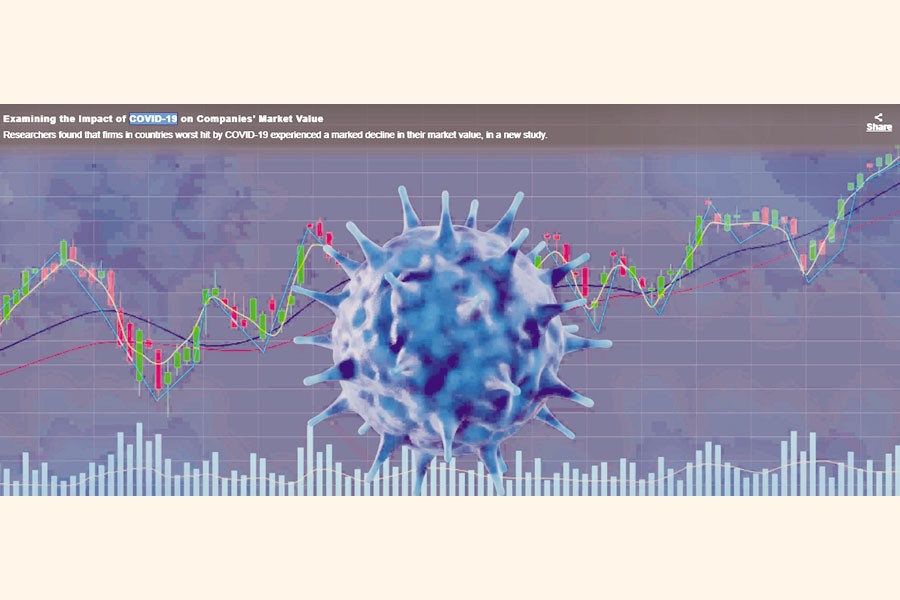Corporates’ sustainability performance
What it means for firm value
Does sustainability performance of corporates help preserve firm value at a time of pan

Sudipta Bose, Syed Shams, Muhammad Jahangir Ali, and Dessalegne Mihret
Published :
Updated :

Whether the engagement of corporations on sustainability matters contributes to business performance has been a vexed issue. The issue has become even more important as the world has witnessed the damaging effects of COVID-19 since early 2020, leading to the shutting down of many aspects of economic and social life worldwide. Based on an international sample of firms, a recent research has examined the association between the impact of COVID-19 on an economy and changes in firm value, and whether this association is moderated by firm-level sustainability performance. Based on a stakeholder value maximization argument, the researchers argue that the sustainability performance of a firm attenuates the negative impact of COVID-19 on changes in firm value.
Although the world has experienced several pandemics from the late twentieth century through the early twenty-first century, caused by infectious diseases such as Zika fever, Ebola, severe acute respiratory syndrome (SARS), avian flu, swine flu, and Middle East respiratory syndrome (MERS), the COVID-19 pandemic is more lethal with an extensive global spread aided by today's service-oriented economy, in comparison to previous pandemics. For example, the World Bank (2020) predicts that the global economy would shrink by 5.2% in 2020 due to the COVID-19 pandemic and that it would also experience the deepest recession since the Second World War. In this continuing economic turmoil, COVID-19 has hugely affected the equity market and most stock indices worldwide have fallen (World Economic Forum [WEF], 2020). For example, Baker shows that while the Spanish Flu of 1918-1920 triggered daily stock market movements of not more than 2.5%, COVID-19 has triggered these movements 24-fold. Conversely, several financial experts argue that firms with a strong focus on sustainability practices and fair management of stakeholders appear to have outperformed their counterparts that lack this focus.
While evidence shows that firm value declines when crises occur, we know little about what factors enable firms to minimize firm value reduction during these periods. Prior to COVID-19, some studies investigated the outcomes of several pandemics (including Spanish flu, Zika fever, Ebola, SARS, avian flu, swine flu, MERS, enterovirus 71 [EV71], dengue fever, and H1N1) on stock returns, mutual funds, and firm performance. Compared to prior infectious disease pandemics, the global nature of the COVID-19 pandemic allows a study on large cross-country samples with hypotheses developed on this emerging issue. Secondly, a decline in firm value has been observed following the onset of the COVID-19 pandemic, with this suggested by a 38% drop in the Dow Jones Industrial Average Index by March 2020 and Standard & Poor (S&P)'s Global Ratings Index experiencing a 35% drop in February 2020 alone (Johnston, 2020). In addition, coupled with financial experts' commentary on the possible role of firms' sustainability performance in protecting firm-value decline, the recent market volatility due to COVID-19 provides the opportunity to examine the role of sustainability performance in protecting firm value.
The researchers draw on the ongoing debate of the potential merits of the "stakeholder value" model, versus the widely adopted "shareholder value" model of business. Several publicly listed companies in various industries are affected by declining share prices, revenues, and profit during the COVID-19 pandemic. Despite the general decline in share prices and dramatic stock market volatility worldwide, commentators observe that companies with a focus on sustainability have tended to outperform others.
Using data from 4,278 firms in 47 countries, the study shows that firms domiciled in countries where the COVID-19 impact is more devastating suffered greater decline in firm value. The negative impact of COVID-19 on firm value is less pronounced for firms with better sustainability performance. Firms domiciled in countries with a higher level of environmental- and stakeholder-value-oriented culture experience less decline in firm value from the impact of COVID-19. Findings suggest a firm's stakeholder-value orientation contributes to preserving a firm's value when general stakeholder value declines.
This important contribution is based on a cross-country study given that COVID-19 has an acute and long-lasting global impact compared to other pandemics in the past. The study contributes to the ongoing debate on shareholder- versus stakeholder-value focus as a viable alternative underpinning corporate governance. The findings of this study have important implications given that COVID-19 has severely damaged health and economic well-being worldwide. Firms have the incentive to follow stakeholder-value-oriented governance, which would benefit the preservation of their value as well as contributing to societal well-being, especially at times of pandemic outbreaks or other crises of a similar scale in the future. The findings suggest that corporate sustainability performance needs to be considered in rolling out possible stimulus packages to boost economies in the post-pandemic period. The findings could inform governments, regulators, investors, financial analysts, and managers about the influence of sustainability performance on firm value.
Dr Sudipta Bose is a senior lecturer, Newcastle Business School, The University of Newcastle. Dr Syed Shams, Senior Lecturer of Finance and Associate Head Learning and Teaching, University of Southern Queensland. Muhammad Jahangir is an Associate Professor of accounting at La Trobe University and Dessalegn Mihret is an Associate Professor of accounting at RMIT University.”
[The article is based on a published article entitled 'COVID-19 impact, sustainability performance and firm value: international evidence' in the Accounting & Finance journal.]


 For all latest news, follow The Financial Express Google News channel.
For all latest news, follow The Financial Express Google News channel.